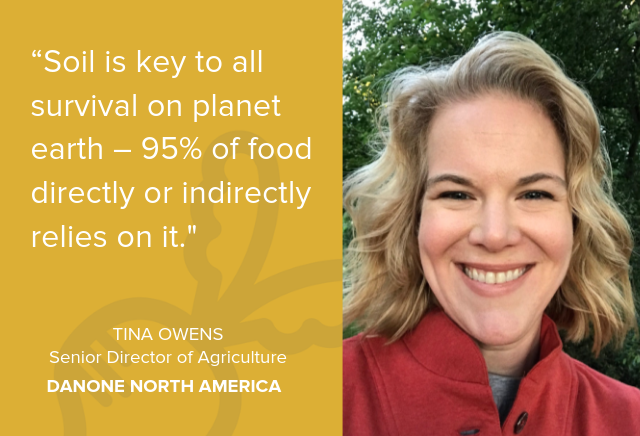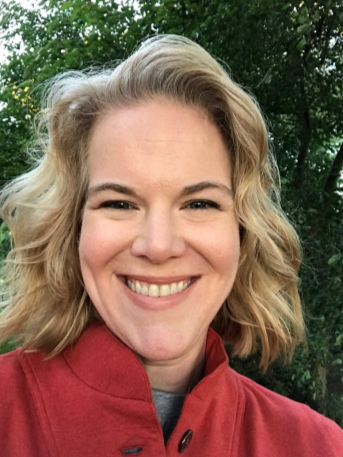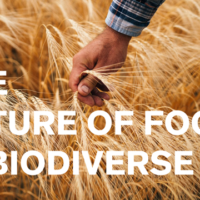
Food+Tech Connect and The Future Market are hosting Biodiversity: The Intersection of Taste & Sustainability, an editorial series featuring interviews with over 45 leading food industry CEOs, executives, farmers, investors and researchers on the role of biodiversity in the food industry. Read all of the interviews here.
Throughout this series, we’ve spoken a lot about diversifying what we’re eating, but diversity in our soil is equally important. Soil biodiversity, the variability of living organisms in our soil that interact with one another and with plants and animals in the ecosystem, is critical to the health and functioning of all ecosystems. Healthy soil provides a myriad of essential ecosystems services, like carbon sequestration, storing and processing water and enhancing plant health.
Below, I speak with Tina Owens, senior director of agriculture for Danone North America, about how and why the company is supporting soil health through its multi-million dollar research program dedicated to helping farmers enhance the organic matter in their soil and its overall fertility. She also shares insight into how the company measures its impact on soil health, as well as how it invests in farmers to help them covert to soil practices that promote biodiversity.
___________________
Danielle Gould: Is biodiversity a priority for Danone North America? If so, how and why?
Tina Owens: Yes, biodiversity is a major priority for Danone North America because it is a major driver of the health of our planet. Our global vision of One Planet. One Health is guided by the belief that the planet that feeds us and the lives of everyone on it are deeply interconnected. As a public benefit corporation and the largest Certified B Corporation® in the world, we are committed to both business and social progress, and we embed responsible animal welfare, sustainable agriculture and innovative regenerative farming practices into how we do business.
DG: How does Danone North America define and think about biodiversity?
TO: Because we know the health of people and the health of planet are inseparable, we think about and prioritize biodiversity through the very foundation of our food system: the health of our planet’s soil. Soil is key to all survival on planet earth – 95 percent of food directly or indirectly relies on it. We offer a diverse range of dairy and plant-based products, and all of them rely on and have the ability to contribute to healthy soil.
DG: What is Danone North Americadoing or planning to do to promote biodiversity?
TO: As America’s largest yogurt maker, we saw an opportunity to initiate a breakthrough soil health research program through our own supply chain and relationships with farmers. In March 2018, we launched a multi-year, multi-million-dollar soil health research program to help farmers reach for better soil health and improve their own livelihoods. We also announced our ambition to commit up to $6M for the research program over the next five years.
Through our soil health research program, Danone North America aims to identify ways to help regenerate soils – including enhancing organic matter and soil fertility with long-term benefits like soil carbon sequestration, reduced chemicals use, water holding capacity, biodiversity and economic resilience of farmer communities. In partnership with growers, dairy farmer partners and third-party soil health experts, our program includes soil sampling, review of crop yield, conversations with growers about their individual needs, data collection and analysis, first reports and field days with farmers to provide training around soil health best practices.
But we can’t do it alone, so Danone North America joined The Carbon Underground, Green America and other food companies to inform the design and development of a new global certification standard for food grown in a regenerative way.
Finally, the company is exploring options to participate in the Regenerative Organic Alliance, a group working to develop a new standard, which will be known as Regenerative Organic Certification. The work with the Regenerative Organic Alliance would complement our commitment to the USDA Organic Standard through pioneering brands, like Horizon Organic, which was instrumental in working with the USDA to establish organic standards and the USDA Organic seal. We seek to understand how this proposed certification can benefit our planet and farming communities through soil health, animal welfare, social fairness and offer more choices for our consumers and our business.
DG: What investments need to be made to create a more biodiverse food system?
TO: With all life beginning in soil, using agricultural practices that can help regenerate soils is an urgent need. We believe all food companies have a responsibility to protect the health and vitality of soil we rely on for business. Danone North America believes that making changes like embracing innovative farming practices is critically important for the future of agriculture, and the private sector has an essential role to play in making sure these changes happen on a significant scale.
Beginning in 2017, we began working with EcoPractices, a third-party partner that gives us the technology we need to assess risks and sustainability performance in our supply chain, to better understand the practices behind how crops are grown on several farms that feed into our dairies. This partnership allowed us to determine whether the farms were increasing biodiversity through the planting of cover crops and crop rotations, and we began monitoring pesticides, fertilizers and herbicide application. In addition to our animal feed crops like non-GMO corn, soy and canola, these farms grew twelve cover crops including varieties of oats, triticale, winter wheat, rye, peas and radishes. Because cover crops help our farmers with productivity, while also reducing environmental impact, we continue to advance our strategy of funding cover crops and crop rotations throughout our supply chain.
Our North American agriculture team is heavily focused on opening avenues of new investment via grants, private partnerships and impact investing that will help more of our farmers convert to soil practices that promote a more biodiverse system. But we do not expect the individual farms to bear the brunt of work required to change current agricultural practices, so we use our position within the industry to open doors across the food system – through policy advocacy, access to funding or training or raising awareness – to drive positive change throughout our agricultural community.
DG: What are the greatest challenges and opportunities your organization faces for creating a more biodiverse system? What are you doing to overcome or capture them?
TO: As America’s largest yogurt maker and top plant-based producer, we have an opportunity to promote the vitality of soil on a large scale with the help of our grower and farmer partners. That’s why we’ve committed more than $6 million over five years to our soil health research program and engaged a host of growers, farmers, NGOs and experts to support a healthy planet.
DG: How are you or how do you plan to handle the sourcing and scaling of biodiverse ingredients or agriculture?
TO: As the top organic food maker in the U.S., with pioneering organic brands, we work to find opportunities to apply our knowledge of sustainable practices across all of our businesses and diverse supply chains, from organic to Non-GMO Project Verified to conventional. Whether it is driving more sustainable ingredient sourcing or advancing packaging recyclability, we bring all of our businesses along on the path to a better world through food. We’ve put responsible, sustainable sourcing practices into place throughout our supply chain and made them an integral part of our strategy. Some examples of this work in action include: rolling out a compliance program to 100 percent of our suppliers to help us track where they are located so we can be conscious about working with local suppliers where possible and working to drive change in packaging by committing to pursue the goals outlined in Danone’s 2018 Packaging Policy.
Participating in pilot programs or working groups like Regenerative Organic Certification or the Carbon Farming Innovation Network allows us to serve as a leader within our communities when it comes to incorporating innovative ways of working and adopting new standards and certifications. We’re participating in industry leading programs, engaging at the nucleus of these groups to embed new ways of working and thinking into our long-term strategies.
An example of scaling a biodiverse agricultural product would be under our Horizon Organic brand, the first national organic milk brand in the United States, and a brand that worked with the USDA to establish organic standards and the USDA Organic seal. Our Horizon Organic Grassfed milk, which is from cows that are pasture-raised and graze on certified organic fresh pasture, launched in 2018 and represents our commitment to raising the bar on the organic experience for both the consumer and the dairy cow.
DG: What is your vision for what a more biodiverse food system looks like in 10-15 years?
TO: We believe a more biodiverse food system requires a reinvention of our relationship with food. In fact, we’d go so far as to call it a food revolution — one for greater well-being for people and the planet — which we are eager and ready to boldly lead, together with consumers, retailers, farmers, suppliers and not-for-profits, to design, produce, market and consume food in new, healthier and more sustainable ways.
We all have a stake in food, both for the fundamental nutritional needs it serves and the enjoyment it brings us. The profound role that food plays in unlocking the health of people and the planet is a central premise behind our parent company Danone’s signature — One Planet. One Health — which invites others to use their everyday decisions to join us in building a healthier world through food.
We are using our size as a large food company as a force for good and hope others join so we can leave this planet for future generations in a state of health better than that which we inherited.
Read all of our biodiversity interviews here and learn more about Biodiversity at The Future Market.
___________________________
 Tina Owens, Senior Director of Agriculture at Danone North America
Tina Owens, Senior Director of Agriculture at Danone North America
Tina Owens is the Senior Director of Agriculture for Danone North America, the largest public benefit corporation and the largest Certified B Corporation in the world. Tina leads the charge for regenerative agriculture practices, farmer profitability, unique animal feed supply chain development and regenerative financing. She also oversees Danone’s public commitment to soil health in North America, working with partners such as Cornell University and EcoPractices.
Prior to joining Danone in 2018 Tina led sustainability and strategic sourcing at Kashi Company, including the brands Bear Naked, Stretch Island Fruit Company, and Pure Organics. At Kashi she led the strategy on eight commodities to convert farmers to organic practices via the company’s collaborative effort with QAI on the Certified Transitional protocol. Under Tina’s leadership this program returned over $2 million in increased profitability from 2016 to 2018 across a cohort of 14 farms. Tina instituted
Tina and her family live on 12 acres in Michigan where they are transitioning previously farmed land to grow a variety of food using an agroforestry and regenerative approach.





